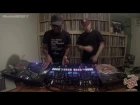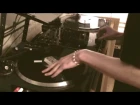Makeba Skratch | pt
Shes toured with MC Lyte on her tour with Kriss Kross, recorded songs with a host of artists, including Heather Headley, MC Lyte, Sunz of Man, Royal Fam, Monkee (Junk Yard Tactics), Mahog Bless and most notably with Talib Kweli on Lunchroom Classics - a single from the compilation album Tags of the Time, and was a writer for the European based magazine WICKED. Makeba has not only written and recorded music, shes immersed herself in the business behind it, working in Product Management, promotions, retail, radio, and publicity. She had two management companies Duke da Moon, in which she...
Paul Murphy a.k.a. Skratch Bastid was born in Halifax, Nova Scotia. He was a nerdy kid obsessed with hip hop and after saving his pennies bought turntables and began to pester dj's to help him learn how to master them. The name was born because often within days of being taught a trick by a dj, Paul would master the skill and excel at it often bringing the words "little bastid" to the lips of his teachers. The name was born. But this is where he begins to define himself from the regular dj's. He dominates the competitive circuit playing...
The Invisibl Skratch Piklz were a group of American/Latin/Filipino turntablists.
The members of the group were originally hip-hop DJs, who were among the pioneers of the turntablism movement in the 1990s; turntablists create musical pieces by mixing samples from records, by using multiple turntables as instruments. The group started in 1989 as the "Shadow of the Prophet", although Disk and Qbert had already discussed starting a group together, which would gestate into the Invisibl Skratch Piklz.
The group began with DJ Q-bert, Mix Master Mike, and DJ Apollo (who left the group in 1993). The group later added DJ Disk,...
Miriam Makeba (Joanesburgo , 4 de março de 1932- Castel Volturno, 10 de novembro de 2008) foi uma cantora sul-africana também conhecida como "Mama Afrika" e grande ativista pelos direitos humanos e contra o apartheid em sua terra natal.
Seu momento decisivo aconteceu em 1960, quando estrelou o documentário anti-apartheid Come Back, Afrika, apresentado no Festival de Veneza daquele ano, com ela presente. A recepção que teve na Europa, e as condições que enfrentava na África do Sul. fizeram com que Miriam resolvesse não retornar ao país, o que fez com que seu passaporte sul-africano fosse revogado.
Ela foi então...






